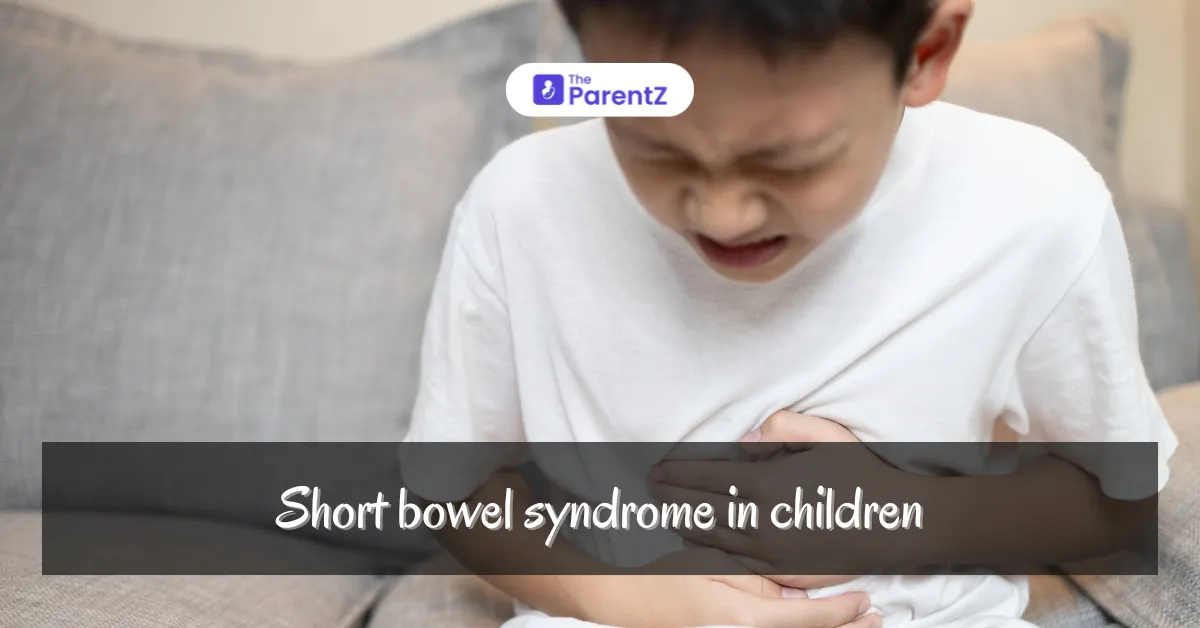Short Bowel Syndrome (SBS) is a malabsorptive condition that occurs when a significant portion of the small intestine is missing or has been surgically removed. This condition leads to difficulties in nutrient absorption, causing growth delays, malnutrition, and other complications.
What is Short Bowel Syndrome?
SBS arises when there is insufficient length of the small intestine to properly absorb nutrients, fluids, and electrolytes. The small intestine is responsible for absorbing most nutrients; its loss disrupts this function, leading to malabsorption.
Children with SBS may develop:
• Nutrient Deficiencies: Due to decreased surface area for absorption.
• Dehydration and Electrolyte Imbalances: Resulting from poor fluid absorption.
• Intestinal Failure: In severe cases, where parenteral (IV) nutrition is required for survival.
Epidemiology
• Incidence: SBS is rare, with an estimated incidence of 3-5 per 100,000 live births annually.
• Most Common Age Group: Infants and young children, particularly neonates who undergo intestinal surgery.
• Survival Rates: Improved significantly due to advancements in surgical techniques and nutritional support.
Causes of Short Bowel Syndrome in Children
1. Congenital Conditions:
• Gastroschisis (intestines develop outside the abdominal cavity).
• Intestinal atresia (part of the intestine is missing or blocked).
2. Surgical Removal of Intestine:
• Necrotizing Enterocolitis (NEC): A severe intestinal disease in premature infants.
• Midgut Volvulus: Twisting of the intestine, cutting off blood supply.
• Trauma or tumors requiring resection.
3. Crohn’s Disease:
• Rare in young children but can necessitate bowel removal in severe cases.
Symptoms of Short Bowel Syndrome
The severity of symptoms depends on the length and function of the remaining intestine. Common symptoms include:
Digestive Symptoms:
• Chronic diarrhea.
• Steatorrhea (fatty stools).
• Abdominal pain or bloating.
Systemic Symptoms:
• Malnutrition and growth delays.
• Dehydration and frequent urination.
• Fatigue due to energy deficiencies.
Nutrient Deficiencies:
• Iron and folate deficiency: Leading to anemia.
• Vitamin A, D, E, and K deficiencies: Causing vision issues, bone weakness, and clotting problems.
Diagnosis of Short Bowel Syndrome
1. Medical History:
• History of surgery, congenital conditions, or persistent malabsorption symptoms.
2. Physical Examination:
• Signs of malnutrition, dehydration, and poor growth.
3. Laboratory Tests:
• Blood tests: Assess nutrient levels, electrolytes, and organ function.
• Stool analysis: To detect fat malabsorption.
4. Imaging Studies:
• Abdominal X-rays or ultrasounds: To assess the remaining bowel.
• Contrast studies: Evaluate intestinal length and function.
Management and Treatment
Treatment for SBS focuses on maximizing nutrient absorption and supporting growth while preventing complications.
1. Nutritional Support:
Parenteral Nutrition (PN):
• Delivers essential nutrients intravenously, bypassing the digestive system.
• Used in the early stages or severe cases of SBS.
Enteral Nutrition:
• Feeding through a tube directly into the stomach or small intestine.
• Stimulates bowel adaptation over time.
Dietary Modifications:
• High-calorie, high-protein diets.
• Supplementation of vitamins and minerals (e.g., iron, calcium, and fat-soluble vitamins).
2. Medications:
• Anti-Diarrheal Agents: To slow intestinal motility (e.g., loperamide).
• Proton Pump Inhibitors (PPIs): Reduce stomach acid, improving nutrient absorption.
• Bile Acid Binders: For those with bile acid malabsorption.
• Teduglutide: A medication that enhances intestinal adaptation and absorption.
3. Surgical Interventions:
• Bowel Lengthening Procedures: Such as serial transverse enteroplasty (STEP) to increase the functional length of the intestine.
• Small Bowel Transplantation: For severe cases where other treatments fail.
Complications of Short Bowel Syndrome
1. Intestinal Failure: Dependency on long-term parenteral nutrition.
2. Liver Damage: Due to prolonged PN use.
3. Infections: Increased risk due to catheter use for PN.
4. Kidney Stones or Gallstones: Caused by altered bile and fat metabolism.
Prognosis
• Many children with SBS experience significant improvement due to bowel adaptation, where the remaining intestine grows and compensates for the lost segment.
• With proper care, children can achieve normal growth and development, though some may require lifelong dietary adjustments or medical interventions.
Future Directions in SBS Management
Research is ongoing to develop:
• Enhanced medications like growth factors to promote bowel adaptation.
• Improved surgical techniques for bowel reconstruction.
• Artificial intestines or bioengineered tissue for transplantation.
Conclusion
Short Bowel Syndrome in children is a challenging but manageable condition with early diagnosis and a multidisciplinary approach. Advancements in nutritional support, medications, and surgical techniques have significantly improved outcomes, allowing affected children to lead healthy lives. Parents and caregivers should work closely with pediatric gastroenterologists to optimize treatment and ensure the best possible quality of life for their child.
References
1. American Journal of Clinical Nutrition: Updates on SBS management.
2. PubMed: Comprehensive reviews on intestinal failure and adaptation in children.
3. National Institute of Diabetes and Digestive and Kidney Diseases (NIDDK): Guidelines for SBS diagnosis and treatment.





Be the first one to comment on this story.